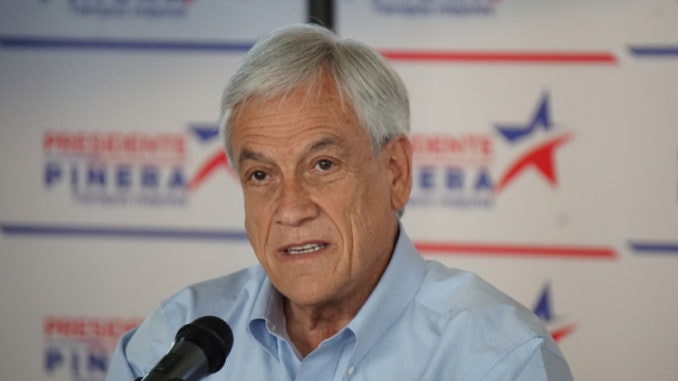
By Isabel Cocker / Santiago Times
“I always said that we would never win the first round outright”, Presidential Candidate Sebastián Piñera commented last week at an international press conference. “And I know that the next round will also be narrow, but I am confident that we will win as we did in 2009.”

No matter how self-assured he seemed in front of the press, it is clear that the expected easy victory of the ex-President has been cast into doubt. Polling previous to the election by CADEM and other agencies had put support for the right-wing candidate at 42-46%, however on Sunday Piñera struggled from the beginning and it was soon clear that he would not reach 40%.
By the end of the evening, Piñera was declared by some as having “won” the first round, as he was the most popular single candidate. Yet, at 37%, it was with a much smaller majority than had been hoped for by Chile Vamos, the coalition supporting the ex-President’s new bid for the presidency.
Piñera attributed his low results to the higher-than-expected support for José Antonio Kast, a more extreme right-wing candidate who drew 8% of the vote. “In total, we have 44%, just as we did in 2009”, he declared several times yesterday, counting all of the votes for the Right. In 2009, Chile Vamos gained 44% of the votes of the first round, and then went on to win the second round with 51% against ex-President Eduardo Frei.
Nevertheless, not all of Piñera’s loss can be explained by Kast’s unexpected popularity. A large part of the difference can be attributed to so-called “invisible voters” who, despite not being shown in polls, rushed to support Beatriz Sánchez. The leader of the newly-established Frente Amplio has never held public office, yet she gained many followers for the left-wing coalition promising an alternative to the traditional centre-left and centre-right parties. Although she had been polling at 12-15%, she reached 20% in the actual vote on Sunday.

Piñera himself is dismissive of the votes which Frente Amplio drew. “Yes, I suppose it was a surprise” he admitted, before countering that “what was the bigger surprise was that Nueva Mayoria gained their lowest votes in the coalition’s history.” However, using the same logic which Piñera applied to the Right, Guillier and the candidates running as left-wing gained over 50% of the vote.
Some people had posited that Piñera would turn to Carolina Goic and the Christian Democrat Party for their support in the second round of elections, as they hold many shared social values. Piñera himself did not rule this out at the press conference, noting that “Votes do not belong to anyone, we will appeal to the social centre of people, people who believe in moderation, common sense, progression, those Chileans who want change for the better.” Nonetheless, later on Monday evening, Goic renounced the leadership of the party and backed Guillier for the second-round victory, leaving Piñera with an even smaller section of the population to appeal to.
It is clear that Piñera does not believe that Nueva Mayoria and Guillier should hold office for any longer. He criticised the way that they ran both the presidential campaign, and the senate races which also took place on Sunday, stating that “there is a tradition in which it is always the citizens who decide. But this time there were a lot of politicians who financed and ran their campaigns in a way which interfered with free elections.”
“Today we have a bad government and a good country”, he stated, scathingly referring to the Bachelet administration. “We need to replace the bad government to improve the country which is currently stagnant.”



